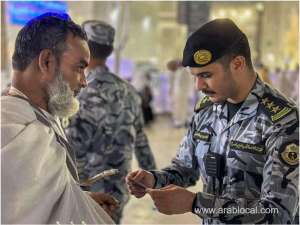Col. Talal Al-Shalhoub, security spokesman of the Ministry of Interior, announced on Saturday that the first phase of the Hajj security plans had been successfully completed, with all pilgrims arriving at Arafat on time. This success is attributed to the integrated traffic and organizational plans that ensure flexibility, promptness, and efficiency.
During a press conference at Arafat, Col. Al-Shalhoub stated that penalties were imposed on 25 individuals on the night of Dhul Hijjah 9 for transporting 103 people without Hajj permits.
He further detailed that the second phase of the Mashaer Train operations is currently underway, transporting pilgrims from Arafat to Muzdalifah, where they will spend the night before returning to Mina for Eid Al-Adha and the following days of Tashreeq. Security personnel are actively managing the smooth movement of vehicles and pedestrian pilgrims on the roads leading to Arafat, Muzdalifah, and Mina. They also support crowd control at the Mashaer Train stations and the Grand Mosque, ensuring safe and organized pilgrim movements.
Col. Al-Shalhoub urged pilgrims to adhere to the regulations, routes, and schedules specified for Tawaf Al-Ifadah and the ritual of stoning at Jamrat Al-Aqaba.
Dr. Muhammad Al-Abdel Aali, spokesman of the Ministry of Health, reported the success of the ministry's health plan on the Day of Arafat. Over 112,000 pilgrims received various medical services from the ministry, including treatments at specialized clinics, pharmacies, dialysis centers, intensive care units, and isolation units. The health services provided included 20 open-heart surgeries, 230 cardiac catheterizations, and 819 kidney dialysis procedures. Additionally, 569 cases of heat exhaustion were monitored.
Dr. Al-Abdel Aali advised pilgrims to use umbrellas to prevent sunstroke, avoid direct sun exposure, and stay hydrated to prevent thermal shock.
Ayed Al-Ghuwaynem, undersecretary of the Ministry of Hajj and Umrah for Hajj Affairs, confirmed that the transportation of pilgrims to Arafat was completed by 10:30 a.m. as planned. He emphasized the importance of field teams' presence throughout the Hajj journey to ensure pilgrims' rights and safety.
Saleh Al-Zowaid, spokesman for the transportation system, highlighted that over 300,000 pilgrims were transported via the Mashaer Train.










